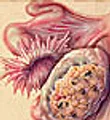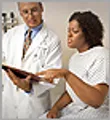WebMD Health News Reviewed byLouise Chang, MD

Dec. 6, 2012 -- Women now have one more reason to eat their fruits and veggies.
A new study suggests that women with higher levels of carotenoids (nutrients found in fruits and vegetables) have a lower risk of breast cancer -- especially cancers that are harder to treat and have a poorer prognosis.
When researchers from Harvard Medical School pooled the results of studies that measured carotenoid levels in women’s blood, they found that those with the highest levels had a lower risk of breast cancer compared to those with the lowest levels.
The association appeared to be stronger for smokers than for non-smokers and for women who were lean compared to those who were overweight.
Eat Your Carrots, Avoid Breast Cancer?Carotenoids are the micronutrients in fruits and vegetables that give them their vibrant orange, yellow, and red colors. Foods that are good sources of carotenoids include carrots, sweet potatoes, spinach, kale, red peppers, and winter squash.
Having higher circulating blood-carotenoid levels may be particularly protective against breast cancers that do not need estrogen to grow.
The finding suggests that eating a healthy, plant-based diet may be one of the first modifiable risk factors for these less common, poorer-prognosis cancers.
“Breast cancer risk factors we have known about all involve more common estrogen-dependent cancers,” says researcher A. Heather Eliassen, ScD.
The study combined data from eight trials that included more than 3,000 women with breast cancer and close to 4,000 women without the disease.
It is not clear if carotenoids directly lowered cancer risk.
But Stephanie Bernik, MD, who is chief of surgical oncology at Lenox Hill Hospital in New York City, says the message to women does not change.
“We have said if we want to reduce the risk of cancer -- not just breast cancer -- eating a plant-based diet low in fat and animal protein may help,” she says. “This study, like others, suggests this is the case.”
The study was published Dec. 6 in the Journal of the National Cancer Institute.
Fruits, Veggies May Help High-Risk Women MostBernik says the suggestion that eating plenty of fruits and vegetables may be particularly beneficial for women at risk for non-estrogen-dependent tumors is especially intriguing.
Many breast cancers in women with a family history of the disease and specific genetic mutations that dramatically increase their breast cancer risk fall into this category.
Sue Friedman, DVM, says making healthy lifestyle choices is important for women with a genetically increased risk for cancer. She is executive director of the genetic cancer research and support group Facing Our Risk of Cancer Empowered (FORCE).
But she adds that maintaining a healthy lifestyle is no guarantee that a high-risk woman will not get cancer, and it's no substitute for aggressive screening.
Friedman should know.
She exercised regularly, didn’t drink or smoke, and had been a vegetarian for 15 years when she was diagnosed with breast cancer at age 33.
At the time she was unaware that she carried the BRCA2 mutation, which dramatically increased her breast cancer risk.
Now more than 14 years later, Friedman believes her healthy lifestyle is one of many things that has contributed to her survival.
“It’s exciting that fruits and vegetables may help prevent breast cancer, but we don’t want to give high-risk women a false sense that if they eat right they don’t have to be vigilant about screening,” she says.
View Article Sources
SOURCES:
Eliassen, A.H., JNCI, Dec. 6, 2012.
Heather Eliassen, ScD, Channing Division of Network Medicine, Department of Medicine, Brigham & Women’s Hospital and Harvard Medical School.
Stephanie Bernik, MD, chief of surgical oncology, Lenox Hill Hospital, New York, N.Y.
Sue Friedman, DVM, executive director, Facing Our Risk of Cancer Empowered.
News release, JNCI.
WebMD: "Types of Breast Cancer."
© 2012 WebMD, LLC. All rights reserved. #url_reference {display: none};#url_reference { display: block; line-height: 150%; margin-bottom: 10px; }#logo_rdr img { visibility: visible; }.titleBar_rdr .titleBarMiddle_fmt { padding-top: 1.5em !important;} Top Picks When to Get a Screening Mammogram Slideshow: Stress-Reducing Foods Health Check: Breast Cancer Treatment Options Breast Cancer's Link to Bone Metastasis Suspicious Mammogram Result: Now What? 7 Tips to Quit Smoking for Good Breast Cancer Home News Reference Videos Community Questions and Answers Glossary MedicationsVisit WebMD Answers
Related to Breast Cancer Breast Cancer Screening Breast Problems Breast Reconstruction Surgery Cervical Cancer Clinical Trials Hair Loss Living Healthy Ovarian Cancer Women’s Health More Related Topics Today in Breast Cancer HEALTH CHECK Dealing With Breast Cancer?
HEALTH CHECK Dealing With Breast Cancer?  SLIDESHOW Breast Cancer: Symptoms and Treatments
SLIDESHOW Breast Cancer: Symptoms and Treatments  SLIDESHOW Top Cancer-Fighting Foods
SLIDESHOW Top Cancer-Fighting Foods  Article Can Estrogen Lower Breast Cancer Risk? .answers_promo_slide {background:#fff;position:fixed;bottom: 0px;display:none;right:-510px;width:510px;z-index:9999;}* html div.answers_promo_slide { position: absolute; }.answers_promo_slide .top {background:url('http://img.webmd.com/dtmcms/live/webmd/consumer_assets/site_images/modules/answers_slide_top_bot.png') top left repeat-x;font-size:1%;height:33px;}.answers_promo_slide .top .left {float:left;height:33px;width:33px;}.answers_promo_slide .bot {background:url('http://img.webmd.com/dtmcms/live/webmd/consumer_assets/site_images/modules/answers_slide_top_bot.png') bottom left repeat-x;font-size:1%;height:20;}.answers_promo_slide .bot .left {background:url('http://img.webmd.com/dtmcms/live/webmd/consumer_assets/site_images/modules/answers_slide_corner.png') bottom left no-repeat;height:20px;width:20px;}.answers_promo_slide .top a {background:url('http://img.webmd.com/dtmcms/live/webmd/consumer_assets/site_images/modules/answers_slide_corner.png') top right no-repeat;display:block;height:33px;text-indent:-5000px;width:33px;}.answers_promo_slide .top a span {text-indent:-5000px;}.answers_promo_slide .content {background:url('http://img.webmd.com/dtmcms/live/webmd/consumer_assets/site_images/modules/answers_slide_bg.png') top left repeat-y;clear:both;padding-bottom:15px;}.answers_promo_slide h3 {display:inline;float:left;margin:0 0 0 20px;width:208px;height:50px;}.answers_promo_slide h3 a {background:url('http://img.webmd.com/dtmcms/live/webmd/consumer_assets/site_images/modules/answers_mod_logo.png') no-repeat;display:block;width:208px;height:50px;text-indent:-5000px;}.answers_promo_slide h3 span {text-indent:-5000px;}.answers_promo_slide ul {clear:both;margin:10px 0 0 20px;padding:0;list-style:none;}.answers_promo_slide li {line-height:18px;}.answers_promo_slide form.qasearch {float:left;position: relative;margin:-10px 0 0 10px;padding:0;width:270px;}.answers_promo_slide form.qasearch label {color: #5E9EBE;display: none;font-size: 110%;height: 20px;left: 5px;position: absolute;top: 32px;width: 190px;}.answers_promo_slide form.qasearch fieldset {border: none;margin: 0;padding: 0;}.answers_promo_slide form.qasearch fieldset legend {color:#333;display:block;font-size:125%;font-weight:normal;margin:0;padding:2px 0 0 0;}* html .answers_promo_slide form.qasearch fieldset legend {margin-left:-6px;}*+html .answers_promo_slide form.qasearch fieldset legend {margin-left:-6px;}.answers_promo_slide form.qasearch input.question {height: 20px;width: 190px;font-size: 110%;color: #5e9ebe;float: left;margin: 5px 10px 0 0;position: relative;}.answers_promo_slide form.qasearch input.asknow {background: url('http://img.webmd.com/dtmcms/live/webmd/consumer_assets/site_images/modules/btn_ask.png') 0 0px no-repeat;border:0 none;cursor:pointer;display:block;float:left;font-size:0;height:25px;line-height:0;margin:5px 0 0;text-indent:-5000px;width:42px;} Close WebMD AnswersMore breast cancer questions?Ask Your QuestionWhat is breast cancer?Who is at risk for breast cancer?What should I know about breast reconstruction after breast cancer?
Article Can Estrogen Lower Breast Cancer Risk? .answers_promo_slide {background:#fff;position:fixed;bottom: 0px;display:none;right:-510px;width:510px;z-index:9999;}* html div.answers_promo_slide { position: absolute; }.answers_promo_slide .top {background:url('http://img.webmd.com/dtmcms/live/webmd/consumer_assets/site_images/modules/answers_slide_top_bot.png') top left repeat-x;font-size:1%;height:33px;}.answers_promo_slide .top .left {float:left;height:33px;width:33px;}.answers_promo_slide .bot {background:url('http://img.webmd.com/dtmcms/live/webmd/consumer_assets/site_images/modules/answers_slide_top_bot.png') bottom left repeat-x;font-size:1%;height:20;}.answers_promo_slide .bot .left {background:url('http://img.webmd.com/dtmcms/live/webmd/consumer_assets/site_images/modules/answers_slide_corner.png') bottom left no-repeat;height:20px;width:20px;}.answers_promo_slide .top a {background:url('http://img.webmd.com/dtmcms/live/webmd/consumer_assets/site_images/modules/answers_slide_corner.png') top right no-repeat;display:block;height:33px;text-indent:-5000px;width:33px;}.answers_promo_slide .top a span {text-indent:-5000px;}.answers_promo_slide .content {background:url('http://img.webmd.com/dtmcms/live/webmd/consumer_assets/site_images/modules/answers_slide_bg.png') top left repeat-y;clear:both;padding-bottom:15px;}.answers_promo_slide h3 {display:inline;float:left;margin:0 0 0 20px;width:208px;height:50px;}.answers_promo_slide h3 a {background:url('http://img.webmd.com/dtmcms/live/webmd/consumer_assets/site_images/modules/answers_mod_logo.png') no-repeat;display:block;width:208px;height:50px;text-indent:-5000px;}.answers_promo_slide h3 span {text-indent:-5000px;}.answers_promo_slide ul {clear:both;margin:10px 0 0 20px;padding:0;list-style:none;}.answers_promo_slide li {line-height:18px;}.answers_promo_slide form.qasearch {float:left;position: relative;margin:-10px 0 0 10px;padding:0;width:270px;}.answers_promo_slide form.qasearch label {color: #5E9EBE;display: none;font-size: 110%;height: 20px;left: 5px;position: absolute;top: 32px;width: 190px;}.answers_promo_slide form.qasearch fieldset {border: none;margin: 0;padding: 0;}.answers_promo_slide form.qasearch fieldset legend {color:#333;display:block;font-size:125%;font-weight:normal;margin:0;padding:2px 0 0 0;}* html .answers_promo_slide form.qasearch fieldset legend {margin-left:-6px;}*+html .answers_promo_slide form.qasearch fieldset legend {margin-left:-6px;}.answers_promo_slide form.qasearch input.question {height: 20px;width: 190px;font-size: 110%;color: #5e9ebe;float: left;margin: 5px 10px 0 0;position: relative;}.answers_promo_slide form.qasearch input.asknow {background: url('http://img.webmd.com/dtmcms/live/webmd/consumer_assets/site_images/modules/btn_ask.png') 0 0px no-repeat;border:0 none;cursor:pointer;display:block;float:left;font-size:0;height:25px;line-height:0;margin:5px 0 0;text-indent:-5000px;width:42px;} Close WebMD AnswersMore breast cancer questions?Ask Your QuestionWhat is breast cancer?Who is at risk for breast cancer?What should I know about breast reconstruction after breast cancer?  VIDEO Breast Cancer Treatments Improving
VIDEO Breast Cancer Treatments Improving  SLIDESHOW Quit-Smoking Tips for the First Hard Days
SLIDESHOW Quit-Smoking Tips for the First Hard Days  Article Mammogram Screening Guidelines
Article Mammogram Screening Guidelines  SLIDESHOW Essential Screenings for Every Woman
SLIDESHOW Essential Screenings for Every Woman  SLIDESHOW Ovarian Cancer: a Visual Guide
SLIDESHOW Ovarian Cancer: a Visual Guide  Article Breast Cancer: Steps to Reduce Your Risk
Article Breast Cancer: Steps to Reduce Your Risk  HEALTH CHECK What Is Your Cancer Risk?
HEALTH CHECK What Is Your Cancer Risk?  SLIDESHOW Reduce Stress and Revitalize Your Life Subscribe to WebMD Newsletters WebMD Daily Women's Health Men's Health Weight Loss Wisdom I have read and agree to WebMD's Privacy Policy. Submit Sign up for more topics! WebMD Special Sections How to Perform a Breast Self-Exam Health Solutions From Our Sponsors Vaccine Questions? Low Testosterone? Bipolar Disorder Facts Birth Control for Moms Blood Sugar Control Bent Fingers? Diagnosed With Low T? Fibromyalgia & Exercise Depression & Adults Child with Diabetes? Vaccines for All Ages Knee Pain Relief Itchy, Scaly Skin? Hearing Aid Alternative Relapsing MS Help In-depth coverage: Psoriasis Treatment on Target?|Healthy Mouth Help|RA Assessment|Living Healthy Guide|Family & Pregnancy Toolbox|Check Your Heartburn Symptoms Find us on:URAC: Accredited Health Web Site
SLIDESHOW Reduce Stress and Revitalize Your Life Subscribe to WebMD Newsletters WebMD Daily Women's Health Men's Health Weight Loss Wisdom I have read and agree to WebMD's Privacy Policy. Submit Sign up for more topics! WebMD Special Sections How to Perform a Breast Self-Exam Health Solutions From Our Sponsors Vaccine Questions? Low Testosterone? Bipolar Disorder Facts Birth Control for Moms Blood Sugar Control Bent Fingers? Diagnosed With Low T? Fibromyalgia & Exercise Depression & Adults Child with Diabetes? Vaccines for All Ages Knee Pain Relief Itchy, Scaly Skin? Hearing Aid Alternative Relapsing MS Help In-depth coverage: Psoriasis Treatment on Target?|Healthy Mouth Help|RA Assessment|Living Healthy Guide|Family & Pregnancy Toolbox|Check Your Heartburn Symptoms Find us on:URAC: Accredited Health Web Site©2005-2012 WebMD, LLC. All rights reserved.
WebMD does not provide medical advice, diagnosis or treatment. See additional information.
View the Original article




0 comments:
Post a Comment